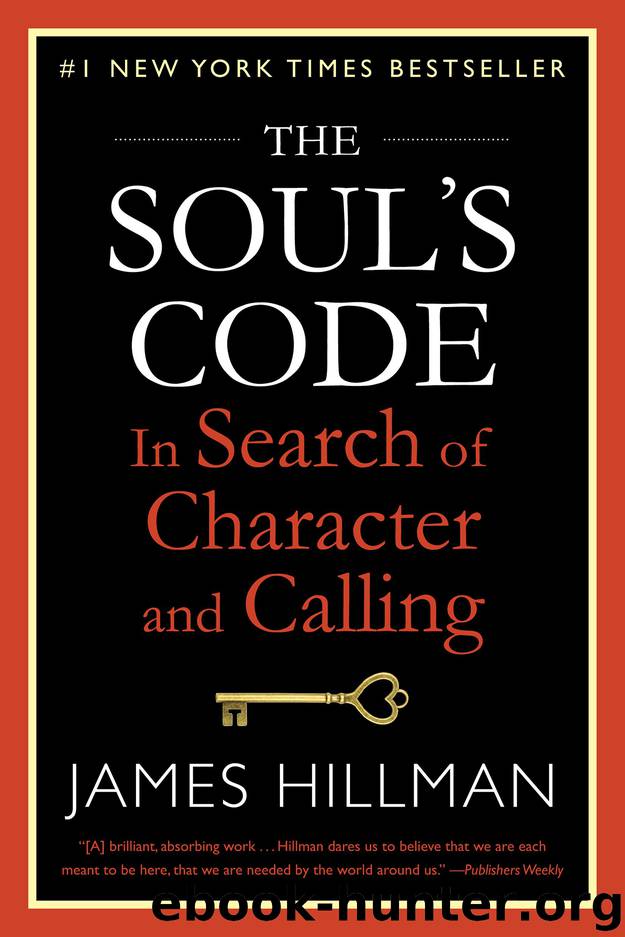The Soul's Code by James Hillman

Author:James Hillman [Hillman, James]
Language: eng
Format: epub
ISBN: 978-0-307-82844-6
Publisher: Random House Publishing Group
Published: 2012-12-18T16:00:00+00:00
PARENTAL FANTASY
What is the connection, if any, between the parental imagination—by “parent” I always mean the immediate, intimate caretaker of a child—and the child’s acorn? How do the parents imagine the child? What do they see in this little person who has been dropped in their laps; what is it bearing on those frail and bony shoulders, what is it looking for with those eyes? Have the parents a fantasy of an invisible fate in the visible traits displayed every day?
Justus Bergman certainly looked for, and recorded, the visible traits displayed every day in his daughter, Ingrid. He was a man filled with fantasy. Ingrid was named after the Swedish princess born two years prior. On Ingrid’s first birthday, Justus filmed her in a white dress; on her second birthday he filmed her again. His third film shows her laying flowers on her mother’s grave. Justus had a photography shop and studio on Stockholm’s elegant Strandvägen, a hundred yards from the Royal Dramatic Theater, and Ingrid was a favorite subject of his camera, dressing in various roles and loving to act in front of her father. At age eleven, during an interval at the theater, she announced her vocation: “Papa, Papa, that’s what I’m going to do.”11
The parental fallacy here sees sublimated incest, a father’s daughter who lived out his controlling fantasy, as so many sons live out their mother’s dreams. The Platonic fantasy, however, says Ingrid’s soul selected exactly the right place and the right father to foster her acorn’s desire. She even selected the right mother, who, by dying early, allowed the intertwining of Ingrid’s calling and Justus’s fantasy to proceed unimpeded by triangles of jealousy.
The parental fantasy may not come as directly as in the example of Justus Bergman. It may instead show itself via dreams, or in overanxiousness, or in parental fights over school, over discipline, over sickliness—and over odd obsessions such as reading pulp fiction and watching midnight movies. The way the child’s behavior is interpreted accords with the fantasy of the caretaker’s vision. Does the mother kick her boy out of the house to play rough with other kids in the street because it’s her fantasy that this boy needs to toughen up and be the man about the house (counterphobic to his weaknesses, and hers), or because of her fear of sissies and “queers,” or because in her mind’s eye she sees her son as a raider, with dash and good looks? The behaviors her instructions ordain or prohibit affect the child less than does the fantasy guiding her instructions.
To expect primary caretakers, for example, parents, to see through the child into the acorn, to know who is there in nuce, and to tend to its concerns—is far too much. That is why teachers and mentors come into the world. He or she is another special person, often someone whom we fall in love with early, or who falls for us; we are two acorns on the same branch, echoing similar ideals. What
Download
This site does not store any files on its server. We only index and link to content provided by other sites. Please contact the content providers to delete copyright contents if any and email us, we'll remove relevant links or contents immediately.
Rewire Your Anxious Brain by Catherine M. Pittman(17598)
Talking to Strangers by Malcolm Gladwell(11901)
The Art of Thinking Clearly by Rolf Dobelli(8858)
Mindhunter: Inside the FBI's Elite Serial Crime Unit by John E. Douglas & Mark Olshaker(7844)
Becoming Supernatural by Dr. Joe Dispenza(7112)
Change Your Questions, Change Your Life by Marilee Adams(6653)
The Road Less Traveled by M. Scott Peck(6644)
Nudge - Improving Decisions about Health, Wealth, and Happiness by Thaler Sunstein(6641)
The Lost Art of Listening by Michael P. Nichols(6481)
Enlightenment Now: The Case for Reason, Science, Humanism, and Progress by Steven Pinker(6411)
Win Bigly by Scott Adams(6324)
Mastermind: How to Think Like Sherlock Holmes by Maria Konnikova(6247)
The Way of Zen by Alan W. Watts(5808)
Daring Greatly by Brene Brown(5648)
Grit by Angela Duckworth(4743)
Big Magic: Creative Living Beyond Fear by Elizabeth Gilbert(4730)
Men In Love by Nancy Friday(4337)
Flow by Mihaly Csikszentmihalyi(4058)
The Four Tendencies by Gretchen Rubin(4028)
